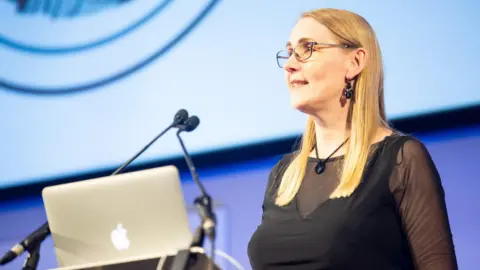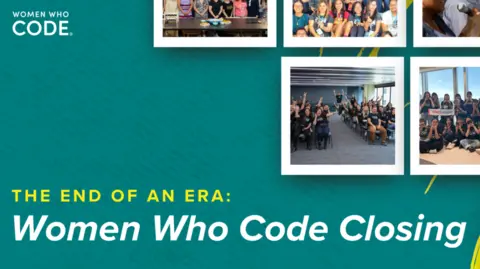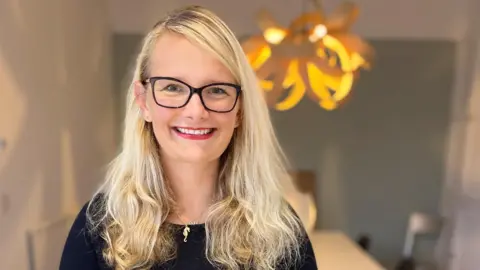 Suw Charman-Anderson
Suw Charman-AndersonGroups supporting women in science, technology, engineering and maths (Stem) fields are struggling to survive as corporations’ shrinking budgets, and cultural changes, see diversity strategies take a back seat.
Ada Lovelace Day – a global annual celebration of women working in Stem – is on borrowed time.
Named after a 19th century female mathematician, the day came into being in 2009 when it was created by Suw Charman-Anderson.
She had graduated with a science degree, but felt “fundamentally unwelcome” as one of just three women in her class. And she later grew tired of going to tech conferences and not seeing any women on stage.
Ms Charman-Anderson says that the initiative is now running out of funds again, as almost happened two years ago.
“We’ve basically limped on since then,” she says. “But I can’t keep making the financial sacrifice.”
It’s not a high-budget operation. At its peak, Ms Charman-Anderson secured £55,000 in sponsorship for 12 months. She says that in other years it has been less than half of that despite high attendance figures at events.
Ms Charman-Anderson adds that she is often told by the tech community that Ada Lovelace Day is inspirational, but it rarely translates into a much-needed injection of cash.
“Organisations can’t run on inspiration alone,” she says. “Everyone in the Women in Stem sector is struggling for money. That’s always been the case, but it seems to have got a lot worse.”
A quick search online reveals a number of women in stem social media accounts that have not posted any content in several months.
And this year saw the sudden closure of the charity Women Who Code, a US-based group with 145,000 members. In June it announced that it was shutting down “due to factors that have materially impacted our funding sources”.
Meanwhile, the US non-profit community Girls in Tech closed in July after 17 years. Founder Adriana Gascoigne told the news site Venturebeat that lack of funding was “the main reason” behind the decision.
In addition, the UK initiative Tech Talent Charter, designed to encourage more diversity generally in the sector, shut in June, blaming tech companies for “quietly quitting” equality, diversity and inclusion (EDI) commitments.
This is something that’s currently generating a lot of debate. There are many examples of reductions in EDI teams and budgets inside corporations great and small, and just as many unofficial anecdotes.
 Women Who Code
Women Who CodeFor some it’s a result of belt-tightening, as even the biggest firms have been laying off thousands of workers, but for others it also signals a broader cultural shift away from prioritising diversity.
High profile critics of EDI include Elon Musk, who bluntly posted in January that it was “just another word for racism”.
Apple chief executive Tim Cook completely disagrees. “Technology’s a great thing that will accomplish many things, but unless you have diverse views at the table that are working on it, you don’t wind up with great solutions,” he told me when I met him in 2022.
He said there were “no good excuses” for the lack of women in tech.
When you look at the data, the tech giants still skew predominantly male. Apple’s most recent published diversity data is from 2022, and lists 35% of its global workforce as being women, and 32% of its leadership teams.
In 2023, 34% of Google’s global workforce were women, and 32% of its leadership teams. At Microsoft, 29% of executive roles were occupied by women.
In the UK, while more young women than previously are opting to study computing science at university, four out of five applicants for entry this year were still male, according to the UK university admissions service UCAS, with just under 3,000 women and just over 12,000 men.
Perhaps the most poignant example I have heard lately about why the numbers game is still important came from MC Spano, a US tech firm boss who now mentors other women in the sector. She told me her own daughter requested to move down from her top set maths class at school because she was the only girl in it.
“Having camaraderie in Stem classes is as important as having the academic achievement,” she says.
 MC Spano
MC SpanoCaitlin Gould runs TecWomenCIC, based in Cornwall. The team recently ran a coding club project for 60 school girls. At the end of it 95% of them said they had enjoyed learning about tech and engineering, and 91% said they understood why the subjects were important to their everyday lives.
However, only the pilot was funded.
Ms Gould says she spends up to 60% of her time trying to figure out where to get funding from, describing the organisation’s financing as “a patchwork quilt”. She told me that often funding comes in the form of a one-off payment, or is offered for a new idea, which makes it difficult to repeat successful campaigns.
“It’s really challenging because there’s so much goodwill,” she says. “I get politicians and people in tech saying, ‘what you’re doing is amazing, how can we help?’, but when I say, ‘well, you can give me some money’ they ask if they can volunteer instead.”
 Caitlin Gould
Caitlin GouldFor the last 15 years, Maggie Philbin, former presenter of the BBC’s science and tech show Tomorrow’s World, has been involved in a scheme called TeenTech, which runs Stem activities in schools.
“Funding is always an issue,” she says. “We have some very loyal funders, but it can be very frustrating when you are working on a hand-to-mouth basis.
“Some funders will fund something over a 12-month period. If you’re really, really lucky, three years, but it’s very tough.”
TeenTech is aimed at children aged between eight and 19 and does not have a particular focus on girls – but sometimes their talents in this area still come as a surprise to their classmates.
“I learned so much about how to work well in a team,” wrote one teenage boy on a feedback form. “And also that girls are actually very good at tech.”


